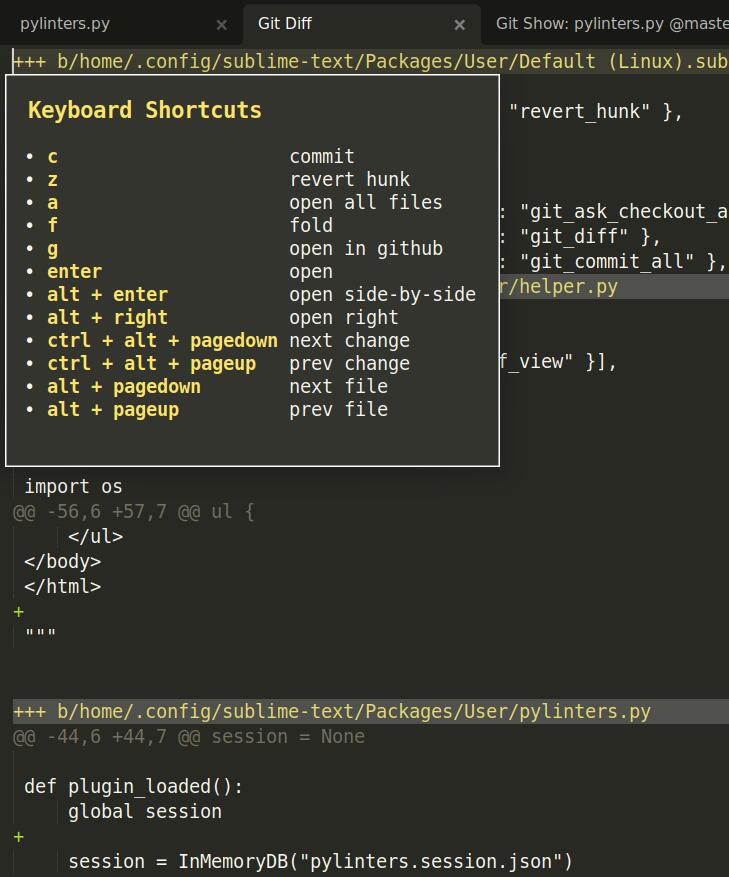I’m posting this here in case some people may find it useful.
I implemented my own Git implementation on top of ST. In some Git views I use a lot of key-bndings (e.g. for Git Diff I can press c to commit, z to revert a hunk, etc.). Since I have a lot of these key bindings, I often forget them. As such I wanted to be able to press h and see all the key bindings associated to a given Git view.
The helper is dynamically generated by Default.sublime-keymap.
"""
On 'h' keypress, show a popup re. the key bindings available for a
given view. Used mostly for Git views.
The help is dinamically generated by Default.sublime-keymap file like this.
Enable helper for a given context:
{ "keys": ["h"],
"command": "show_helper",
"args": {"marker": [{ "key": "setting.git_diff_view" }] },
"context": [{ "key": "setting.git_diff_view" }] },
Add an entry:
{ "keys": ["c"],
"command": "git_diff_view_commit",
"context": [{ "key": "setting.git_diff_view" }],
"help": "commit" },
"""
import os
import sublime
import sublime_plugin
from sublime_plugin import WindowCommand
SUBLIME_ROOT_DIR = os.path.realpath(os.path.dirname(sublime.packages_path()))
SUBLIME_USER_DIR = os.path.join(SUBLIME_ROOT_DIR, "Packages", "User")
HTML = """
<html>
<style>
html {
border: 1px solid white;
}
h2 {
margin-top: 0;
color: #fce566;
font-size: 1.2em;
}
ul {
border: 0px solid white;
padding-left: 13px;
}
.header-wrapper {
border: 0px solid white;
}
.shortcut-key {
font-weight: bold;
color: #fce566;
}
</style>
<body>
<h2>Keyboard Shortcuts</h2>
<ul>
%s
</ul>
</body>
</html>
"""
def show_helper(keys):
popup_max_width = 800
popup_max_height = 800
view = sublime.active_window().active_view()
items = []
for key, help in keys:
key = ", ".join(key).replace("+", " + ")
key += " " * (22 - len(key))
items.append(
f'<li><code><span class="shortcut-key">{key}</span><span class="helper"></span>{help}</code></li>' # noqa
)
html = HTML % "\n".join(items)
view.show_popup(html, 0, -1, popup_max_width, popup_max_height)
# key: ?
class ShowHelperCommand(WindowCommand):
def run(self, marker):
file = os.path.join(SUBLIME_USER_DIR, "Default (Linux).sublime-keymap")
with open(file) as f:
js = sublime.decode_value(f.read()) # json without comments
keys = []
for item in js:
if item.get("context") == marker and "help" in item:
keys.append((item["keys"], item["help"]))
show_helper(keys)



 in the general case).
in the general case).